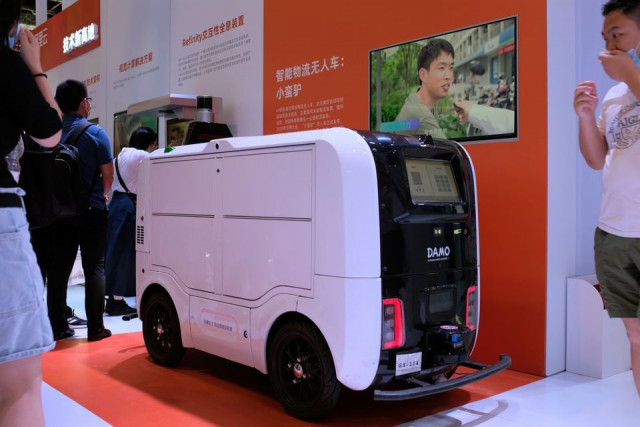Artificial intelligence in Pakistan
Number of startups providing services, building products is relatively small

Artificial intelligence (AI) has been a trending buzzword for some time. It’s a term commonly used for machines, computer-controlled robots, and software systems performing intelligent tasks such as learning, planning, reasoning, and interacting – simulating the natural intelligence displayed by humans and animals.
Usually, when people think about AI, they associate it with human-like robots taking over the world, as depicted in Hollywood movies like I, Robot, Ex Machina, and Westworld, to name a few.
Those films portray a highly advanced version of AI, formally known as Artificial General Intelligence (AGI), which is currently close to impossible. Unlike Hollywood, AI today focuses on narrow problems, such as autonomous driving, stock prediction, virtual assistants, and solving impactful real-world problems.
Most of the fundamental AI concepts have existed for many decades. The term “AI” was coined in 1956 by Stanford computer scientist John McCarthy.
The past decade, however, has shown unprecedented growth in the development of AI technologies – mainly unlocked by the availability of compute power, the enormous amount of training data made available by the Internet of Things (IoT) devices, and the decrease in cloud storage and computing costs.
As a result, AI technologies are already revolutionising most industries, businesses, and lifestyles.
We have sophisticated smart assistants such as Siri on our phones, self-driving cars are closer to becoming a part of our everyday lives, robots help farmers protect their crops from weeds by monitoring and spraying weedicide on plants, AI models can paint and generate images from text, and AI systems are already assisting doctors in the early detection of diseases such as cancer and cardiovascular and neurological disorders.
The global AI software industry is growing rapidly. Statista reports that it is expected to reach $126 billion by 2025. It is considered an engine of economic growth and the next big disruptor.
Many countries have developed dedicated AI frameworks and policies to facilitate education programmes and research and development (R&D) centres to forward technological advancements and economic growth.
Examples include China’s “Next Generation Artificial Intelligence Development Plan,” the US executive order on “AI leadership,” and “AI Made in Germany”, to name only a few. Pakistan must follow suit and invest in programmes to promote youths’ enthusiasm about AI and modern technologies. This means investing in education programmes, research centres, and industry readiness training programmes.
After all, Pakistan has great potential in AI, with its scope ranging from solving local problems in agriculture, governance, climate change, and manufacturing, to creating tech unicorns and services companies specialising in hi-tech/ AI software exports.
In fact, a few research labs, companies, and startups are already making strides in the AI space and contributing to the global tech ecosystem. For example, a group of professors at Information Technology University (ITU) Lahore are solving impactful problems and publishing their research at top-tier AI conferences.
One of the most exciting works from their Intelligent Machines Lab is an economic indicators predictor that uses satellite and aerial imagery. They are developing computer vision/ AI tech that examines a satellite image and responds with a poverty estimate for an area, providing government and policymakers the data to make informed decisions.
The National Centre of Artificial Intelligence (NCAI) is a technological initiative established by the government of Pakistan in 2018.
It aims to become a leading hub of innovation, scientific research, knowledge transfer to the local economy, and training in the area of AI and its closely affiliated fields. It consists of nine research labs from six universities in Pakistan.
In addition, a few more labs at ITU, NUST, LUMS, PUCIT, FAST, and other universities are solving fundamental AI problems. They publish their work at top-tier international venues and collaborate with companies like Google
and Facebook.
Motive (formerly KeepTruckin) is an inspiring example from the industry and a great success story from Pakistan. It’s a US-based tech unicorn that has leveraged Pakistan’s talent pool and built a vital engineering hub in Pakistan.
Motive brings AI to technologically underserved businesses that power the physical economy, such as trucking, construction, energy, and adjacent supply
chain industries.
These businesses still employ inefficient, expensive, laborious, and complex workflows to move trillions of dollars’ worth of goods. Motive equips them with technologies needed to improve their operations’ safety, productivity,
and efficiency.
Typically, companies set up their R&D centres in the West and only outsource basic engineering work to developing countries like Pakistan. Motive has been an exception because it established its primary AI team in Lahore.
This team consists of multiple PhDs, Postdocs in Computer Vision and Machine Learning, and engineers with a solid academic research background. They build AI technologies to help prevent road accidents, keep our roads safer, and save lives.
They have already shipped industry-leading AI products, published their work at top AI conferences, and filed multiple patents thanks to R&D done primarily in Pakistan.
AI – and innovation in general – is not something new to Pakistan. We have a strong talent pool and a growing population of educated youth. We are also an incredible engineering hub with a growing information technology
(IT) industry.
We have over 600,000 IT professionals, with over 25,000 fresh graduates added to the workforce annually. We have around 17,000 software companies providing services to over 120 countries across the globe, bringing in $3 billion in IT export revenue last year.
It is encouraging to look at the tech companies, startups, and research labs working in both applied and scientific research in AI. They are producing world-class AI products, conducting fundamental AI research, and solving impactful problems right here in Pakistan.
And yet, the number of companies and startups providing services and building products in the AI space is relatively small.
We must invest in programmes that help bridge the industry-academia gap and motivate the youth to pursue research and education in AI. We must train some of our existing 600k IT professionals in AI, and we must create more centres like NCAI.
The writer is an Engineering Manager at Motive Technologies (formerly KeepTruckin), where he helps lead the efforts to develop world-class AI products for driver safety
Published in The Express Tribune, July 18th, 2022.
Like Business on Facebook, follow @TribuneBiz on Twitter to stay informed and join in the conversation.



















COMMENTS
Comments are moderated and generally will be posted if they are on-topic and not abusive.
For more information, please see our Comments FAQ